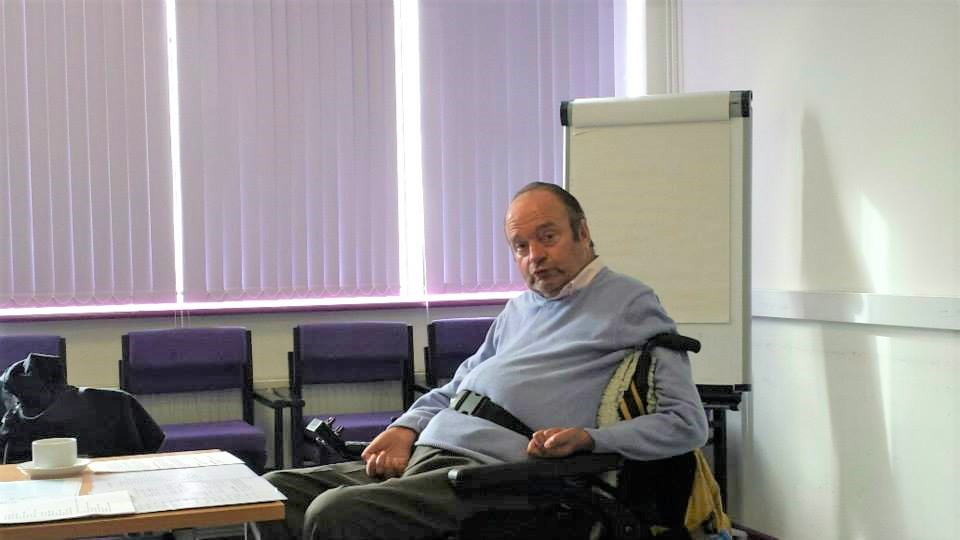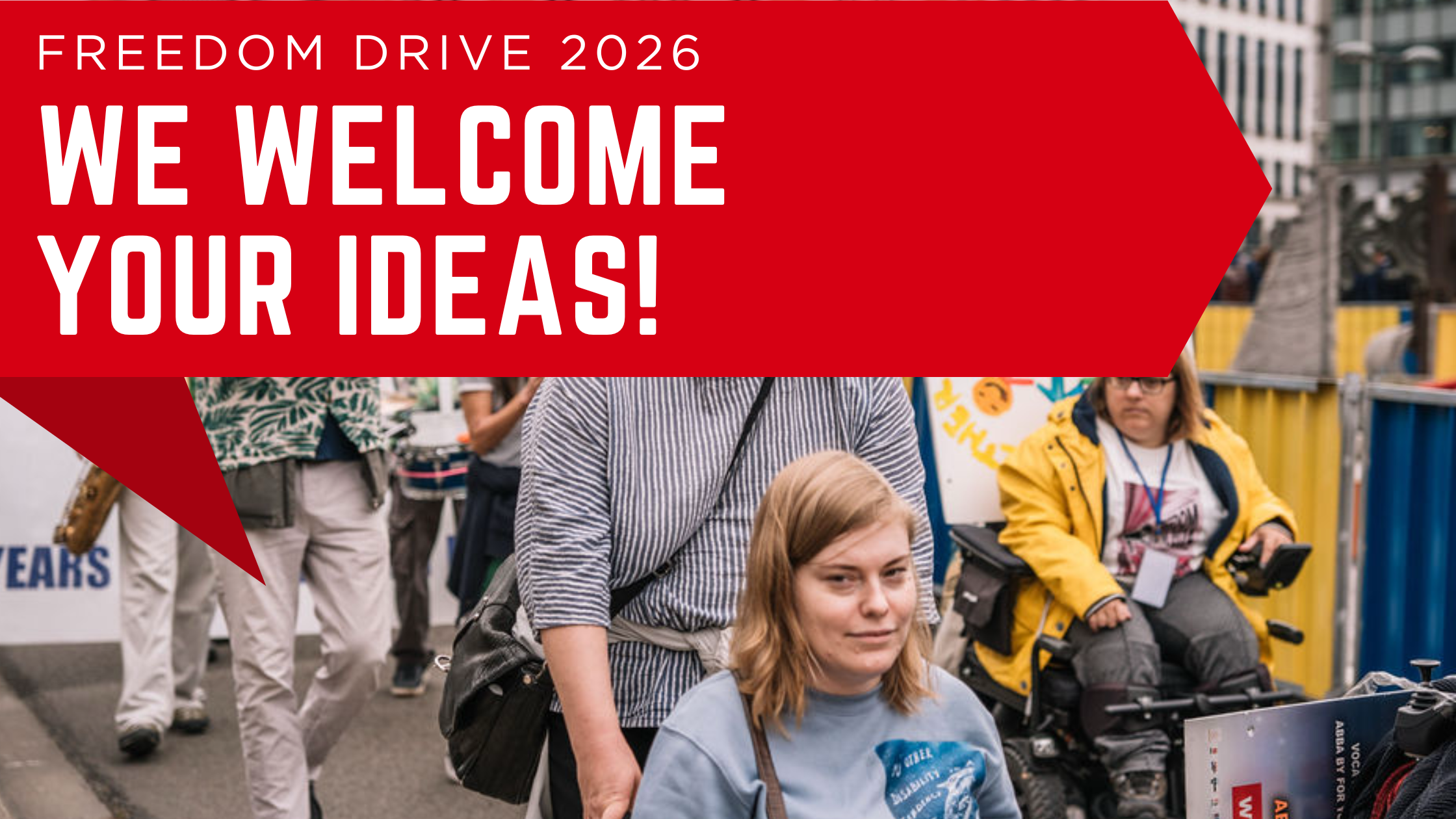In this article, one of the founders of ENIL, John Evans, reflects on the significance of the International Day of Disabled People (IDDP) and the changes we have witnessed in the last 20 years. As one of the pioneers of Independent Living in the United Kingdom, John reflects on the ups and downs of disabled people’s fight for equal rights.
Today, 3 December 2021, is the International Day of Disabled People which we as disabled people and our allies should mark and celebrate our achievements, as well as our losses. It requires some reflection about previous IDDP’s from a personal memory perspective.
This day is significant in more ways than one. It only comes around once a year and we need to maximise its impact upon us and our allies, friends and colleagues. It is our day and we should remember this.
ENIL (European Network on Independent Living) today launched a petition to end institutionalisation for disabled people throughout Europe so the actions go on.
I think in terms of achievements the one that stands high above all the others is without doubt, the establishment of the UN Convention on the Rights of Persons with Disabilities (UNCRPD). This was signed off at a ceremony in 2007 at the UN Headquarters in New York. It had over 187 signatories all representing different Member States (countries) from around the world.
This did not come easy, and it took more than 20 years to achieve thanks to the campaigning resilience of many disabled people and their organisations from all continents around the world. It was also assisted by a lot of promotional PR work by the UN Rapporteur on Disability. When it was finally realised, it certainly deserved a big party to celebrate. I remember myself congregating in a civil building in London together with 2-300 people from all kinds of backgrounds, impairments and organisations joining for the day to celebrate this unrivalled celebration. We watched through a web cam the actual ceremony going on at the same time in New York. We saw our representatives which was a young disabled man together with the Minister of Disabled People signing the UK into the Convention’s charter. It was a very moving moment, especially after knowing and realising that so many disabled people and their allies had fought so hard to get to this point, some of who we sadly lost in the process.
The rest is all history now and 14 years on most countries of the world struggle waiting for their governments to fully implement this human rights legislation for disabled people. We cannot give up until this becomes reality. It will certainly not be in my lifetime but hopefully in the lifetime of millions of young disabled people spread throughout the world.
We have other big achievements to remember which also symbolise the struggle for disabled people in realising their hopes, aspirations and equality and inclusion in the world. In the 1970s disabled people in the UK fought hard to bring about the important social model of disability. This model challenges all other previous models like the medical and tragedy model in the emancipation of disabled people. The social model questions all the environmental and attitudinal barriers which deny the inclusion of disabled people in society. This was a huge achievement. It took some 15 years before local authorities in the UK accepted this model and included it in their strategy and policies for disability services.
Independent living was another milestone in the emancipation of disabled people. This was started by our USA colleagues in the early 1970s and then in the UK and Europe from the late 1970s and early 1980s onwards. This practice and philosophy has transformed the lives of disabled people in many parts of the world, but sadly it still has to be implemented in many of the poorer countries.
There are many other achievements we could mention but we do not have the time and space to do this now.
As far as the other side of disabled people’s lives are concerned, we have witnessed and experienced one of its worst outcomes over the last 2 years. Sadly, this is the incalculable loss of life by disabled people in the Covid pandemic. Disabled people have been the worst victims in this pandemic and we have lost over 100,000’s of disabled people worldwide. These losses are unforgivable and should have been avoided.
We have suffered other losses over the last 13 years particularly since the banking crisis and the onset of the austerity era. This became a time when many countries started cutting back on their social and welfare programmes and services to save money. This has impacted on people’s lives and freedom. It has meant that many disabled people have been disenfranchised by losing some of their independent living packages and social care support. It beggars belief how some of these people have managed to survive but many have been resourceful and resilient in being able to do this. It does not say much about societies responsibilities and care for the welfare of its people. We have also lost many of our organisations during this time through the severe lack of funding due to the austerity measures.
We should also not forget thousands if not millions of disabled people who are being persecuted this very day by simply being political scapegoats and victims of authoritarian regimes in different countries. We know specifically that many disabled people have been arrested and imprisoned in dilapidated conditions in countries like Belarus. Two leaders of the Belarus Independent Living movement are just a few of these. ENIL (European Network of Independent Living) has been circulating a petition around Europe for independent living activists and their allies and friends to sign in the hope that it might do something. We also know that there are many disabled people in African and Asian countries also being persecuted, tortured and held in prison. We remember them in silence in the hope that one day they will also experience freedom once again.
Despite all these setbacks disabled people have maintained their sanity but many others have been affected in terms of their mental health well-being. We will go on and continue to be creative in our ideas. We have a responsibility to all the younger disabled people to leave them positive role models in which to help develop themselves. We certainly will not abandon them but will help them gain strength and unity and develop the tools to help them thrive for the future generations of disabled people.
John Evans OBE
3 December 2021
International Day of Disabled People (IDDP)



